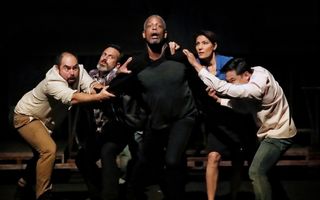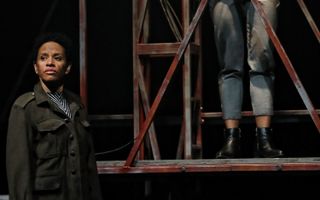 Watch
Watch
Rhetoric
The play is, primarily, about rhetoric – the power of the spoken word to persuade, move and transform. The play’s structure is dominated by lengthy, dense two-person scenes and impressive public speeches in which characters deploy language and imagery to suit their own ends. Despite claiming to hold up a mirror to Brutus so he can see his own face Cassius is actually painting the image he knows Brutus needs to see. Cassius and Brutus’ justifications for killing Caesar are full of fine sounding rhetoric. Cassius masterfully paints an image of a weak, feeble Caesar literally drowning and shaking with fever, then hoists him up on ‘huge legs’ that tower above ‘petty men’ who are unjustly his ‘underlings’ (Act 1, Scene 2).
Brutus hashes out his thoughts in a soliloquy in Act 2, Scene 1, but there is something different about this speech. A soliloquy usually affords a character time for contemplation, to see if they have a ‘spur to prick to the sides’ of their intent (Macbeth, Act 1, Scene 7), but Brutus denies himself this process. In Act 2, Scene 1, he begins the speech resolutely: ‘It must be by his death’, and uses the next 24 lines to justify this choice. He uses multiple metaphorical conceits to arrive at the same conclusion with which he began – Caesar must die:
- ‘It is the bright day that brings forth the adder’
- ‘We put a sting in him’
- ‘Lowliness is young ambition’s ladder’
- ‘Think him as a serpent’s egg’
The power of rhetoric is of course most on display in the Forum scene (Act 3, Scene 2). Both Antony and Brutus know that they need the crowd on side in order for their political enterprise to succeed. Brutus’ appeal to them is a mix of logical argument:
As Caesar loved me, I weep for him; as he was fortunate, I rejoice at it;
as he was valiant, I honour him; but as he was ambitious, I slew him.
And nationalistic intimidation:
Who is here so rude that would not be a Roman? If any, speak, for him have I offended. Who is here so vile that will not love his country? If any, speak, for him have I offended.
He speaks in prose and consciously uses numerous rhetorical figures including:
chiasmus:
Had you rather Caesar were living and die all slaves, than that Caesar were dead, to live all free men?
antithesis:
Not that I loved Caesar less, but that I loved Rome more.
alliteration:
Who is here so base that would be a bondman?
anaphora:
Who is here…? If any, speak…
Who is here…? If any, speak…
Antony, on the other hand, speaks in verse. Although he too uses highly effective rhetorical figures, the key to Antony’s success is his understanding that of Aristotle’s three modes of persuasion (logos, pathos, ethos) the audience, in that moment, needs pathos the most.
Metatheatre
Julius Caesar is, like all of Shakespeare’s plays written around 1599, steeped in metatheatricality – the art of a playwright drawing the audience’s attention to aspects of theatre and performance. The following passage is particularly noteworthy in this regard:
Cassius: How many ages hence
Shall this our lofty scene be acted over
In states unborn and accents yet unknown!
Brutus: How many times shall Caesar bleed in sport,
That now on Pompey’s basis lies along
No worthier than the dust!
Cassius: So oft as that shall be,
So often shall the knot of us be called
The men that gave their country liberty.
Act 3, Scene 1
Cassius and Brutus refer to future (and current, ie. Elizabethan) dramatisations of their actions, naively predicting that they will go down in history as heroes. The passage has particular resonance for Bell Shakespeare and Australian audiences, as we certainly present the play in an accent “yet unknown” in Shakespeare’s day.
The play also deals with the anxieties surrounding the public space and public speeches and debates. Shakespeare seems to be very aware of the performative nature of the Roman identity. The senators constantly refer to themselves in the third person, aware they are playing a role to ensure that future generations and history books remember them in the light in which they have constructed themselves.
When Caesar refuses the crown presented to him by Antony, this is clearly a performance of humility, constructed for an adoring audience. Casca addresses this directly:
If the tag-rag people did not clap him and hiss him,
according as he pleased and displeased them,
as they use to do the players in the theatre, I am no true man.
Act 1, Scene 2
Later, Brutus reminds the other conspirators that they have to mask their true intent:
Good gentlemen, look fresh and merrily.
Let not our looks put on our purposes,
But bear it as our Roman actors do,
With untired spirits and formal constancy.
Act 2, Scene 1
Meaning and Representation
It’s important to remember that a play is, by its nature, polyphonic (having many voices). Unlike most novels, a play rarely has a single authoritative perspective. Directors, actors and audiences have wide scope to determine point of view, and to interpret the story in light of their own circumstances. Shakespeare was particularly masterful at hiding authorial perspective and allowing the audience to make meaning and form conclusions based on questions raised in the play. The poet John Keats, in a letter written to his brothers in 1817, coined the term ‘negative capability’ to describe Shakespeare’s skill in this area:
That is when a man is capable of being in uncertainties, mysteries, doubts, without any irritable reaching after fact and reason.
In Julius Caesar Shakespeare embraces ambiguity. Was Caesar a great man? A petty tyrant? A courageous leader? A superstitious coward? One of the keys to Shakespeare’s longevity is his rejection of the unequivocal. Contrast this with Shakespeare’s source, Plutarch’s Lives, in which the author’s attitude towards Julius Caesar is clear:
But the chiefest cause that made him mortally hated was the covetous desire he had to be called king.
What would Shakespeare’s characters think of this statement? Cassius may agree with this proposition; Brutus would not – he loved Caesar, despite not wanting to see him crowned; Antony and Caesar would definitely disagree.
Shakespeare was wading into a long-running debate over the roles of Brutus, Cassius and Caesar in history. In Plutarch’s Lives, Brutus is portrayed as a noble man whose main concern is the good of Rome. In Dante Alighieri’s 14th-century Inferno, Brutus and Cassius are both consigned to the ‘ninth circle of hell’ for the act of killing Caesar, condemned to be gnawed upon by Satan for all eternity. Since the rise of European fascism in the 20th century, Brutus has usually been portrayed as a freedom fighter with Caesar as a tyrant. Famous productions have variously portrayed Caesar as Hitler, Mussolini, Ceaușescu and Trump among others.
Gender and Power
Out of about 35 named characters, there are only two women in Julius Caesar, Calphurnia and Portia, and they speak in only two scenes each. They aren’t explored in great detail in the Roman historical sources and although Shakespeare affords them intelligence and insight they are unable to take effective action.
Calphurnia seems to have little power in her relationship with Caesar. She is publicly humiliated by him in Act 1, Scene 2 and her advice goes unheeded in Act 2, Scene 2. She begs Caesar on her knees to stay at home and he relents momentarily, but when his manhood is challenged by Decius he quickly dismisses Calphurnia, calling her fears ‘foolish’, and follows Decius to the senate and his death.
Portia seems to have more influence with her husband and a more intimate relationship with him. However, she also throws herself on her knees, begging for Brutus’ secret. Unlike Calphurnia and Caesar, however, Portia’s kneeling makes Brutus uncomfortable (‘Kneel not, gentle Portia’ – Act 2, Scene 1). In the hyper-masculine world of Rome, Portia has to emphasise her adjacency to powerful men (including the very man she’s speaking to) in order to be taken seriously:
I grant I am a woman, but withal
A woman that Lord Brutus took to wife.
I grant I am a woman, but withal
A woman well-reputed, Cato’s daughter.
Think you I am no stronger than my sex,
Being so fathered and so husbanded?
Act 2, Scene 1
Her final appeal, the “voluntary wound” in the leg, is presented as “strong proof of [her] constancy”. This is the point at which Brutus finally relents, calling her ‘this noble wife’ and promising to share his secrets with her. Portia’s suicide, reported stoically by Brutus in Act 4, Scene 3, is a reminder of the mental health struggles of a brilliant woman held back by the stifling gender roles of her environment. Brutus says that she “swallowed fire” (meaning hot coals), shockingly symbolic of her silencing by a society that values her “once-commended beauty” (Act 2, Scene 1) but not much else.
When Cassius wants to emphasise Caesar’s unfitness for office, he turns to misogyny. Caesar behaved “as sick girl” (Act 1, Scene 2) when he had a fever in Spain. How could this man rule? Bemoaning a supposed new breed of submissive Roman citizen, Cassius again draws from the same playbook:
But, woe the while! Our fathers’ minds are dead,
And we are governed with our mothers’ spirits.
Our yoke and sufferance show us womanish.
Act 1, Scene 3
Julius Caesar is a man’s world, a world in which women are dismissed, belittled, and excluded from the public arena. Alongside this misogyny, the men create for themselves a rigid code of masculinity that must be adhered to at all costs. A Roman man must be constant, honourable, fearless and physically fit. Fear of failing to live up to these standards is a major factor in Caesar’s death. And when Brutus dies with “honour” on his own sword, Antony pays him the ultimate Roman tribute: “This was a man” (Act 5, Scene 5).
Past, Present, and Future
The central characters of Julius Caesar are preoccupied with past events and gaining a hold on the future, their legacy, and the transformation of themselves into fixed legend. They often refer to themselves in a self-aggrandising third person: “Brutus had rather be a villager” (Act 1, Scene 2), as if their behaviour and responses are predetermined and their identity set. In the opening act when Cassius works on Brutus he weighs his argument heavily on a loyalty to their past fathers. It is the “Age” that they have shamed, not each other, and fear lies in the possible disruption of the Roman ideal “that every Roman bears” (Act 2, Scene 1), rather than their own personal loss. Caesar and Brutus, despite their faults, are labelled “noble” in death and even Cassius is afforded a flattering farewell: “It is impossible that ever Rome should breed thy fellow” (Act 5, Scene 3). Prior to his funeral oration, Antony claims that it is not Caesar that bleeds but the earth as if the two are intrinsically linked. Caesar’s bleeding body is presented to the crowd as testament of his honour and his legacy is finally solidified: he is now the constant star that he always wanted to be.
If the past is unchanging and the future controlled by such a predetermined image, what Shakespeare exposes his characters to is what they unconsciously fear, the present. Their arguments for conspiracy are disingenuous, the social architect Cassius is a self-professed manipulator and their hasty act of assassination will in fact set the cause of Roman democracy back by centuries. Perhaps it could be said that history is not written by the winners or the losers, but rather by those standing in the middle of the battlefield, between past and present, with the privilege of seeing both sides – Shakespeare.
Politics and The Mob
The big political collision in this play is between Brutus’s idealism and Antony and Cassius’s pragmatism. Antony and Cassius are both Machiavels, but Antony is prepared to go further in order to seize power, including sacrificing his own relatives. Cassius is like a backroom politician, a ’faceless man’, counting the numbers for a political coup. He is, however, often held back by self-doubt, a quality that is absent in Antony’s rise to the top.
The language of the play is infused with politics: it has a comparative clarity, simplicity and directness, a sparse ‘Roman’ style quite different to Shakespeare’s other works.
The play also contains the modern notion of a ‘pre-emptive strike’. Brutus’s justification for killing Caesar – that he may prove dangerous – is one of the earliest known articulations of this principle. After the September 11, 2001 attacks on the United States, pre-emptive war became a key plank of the ‘Bush Doctrine’ – America’s foreign policy under President George W. Bush. At a speech at the West Point Military Academy in 2002, Bush said:
The war on terror will not be won on the defensive. We must take the battle to the enemy, disrupt his plans and confront the worst threats before they emerge. In the world we have entered, the only path to safety is the path of action. And this nation will act.
The mob (the common citizens) are represented as fickle, easily swayed, and potentially violent. We meet them first in the street, making a new holiday to see Caesar’s triumph. Marullus berates them in the opening scene as “you blocks, you stones, you worse than senseless things” (Act 1, Scene 1). Casca then gives us his cynical description of their unrestrained enthusiasm for the role-play coronation, saying that if Caesar had “stabbed their mothers, they would have [cheered] no less” (Act 1, Scene 2). However, after Caesar’s death, they are immediately swayed by Brutus to think Caesar was a tyrant. One of them even calls for Brutus himself to become Caesar, missing the point of democracy altogether. Moments later Antony sways the mob yet again to think the conspirators are traitors and murderers. They are bought by bribery (a gimmicky 75 drachmas each) and in one of the most harrowing scenes of the play, the mob tears an innocent poet to death, even though they know they have the wrong man.
Honourable and Dishonourable Killing
Brutus makes a rhetorical distinction between these two kinds of killing, arguing that the conspirators “purge” rather than “murder” (Act 2, Scene 1). He thinks the killing of Caesar is a necessary moral act, but regrets having to shed blood. When he addresses the people after the assassination he claims that his actions were honourable and says that no one should be offended because he slew his “best lover for the good of Rome” (Act 3, Scene 2).
Caesar’s nobility or otherwise is a great cause for debate. He makes noble statements, which echo Hamlet’s “fall of a sparrow” speech: “Death, a necessary end, will come when it will come” (Act 2, Scene 2). Is he really a tyrant? Does such a thing as a moral killing exist? Can a new society flourish when it is founded on a murder?
It is also impossible to look at this play without addressing the issue of suicide. In much classical writing, suicide in the face of military defeat was seen as noble. Today, we have a very different perspective, doing everything we can as a society to prevent it. Both Cassius and Brutus take their own lives in an attempt to go out with ‘honour’. There are references to these deaths in two of Shakespeare’s later tragedies, Hamlet and Macbeth. Both Horatio, in Hamlet, and Macbeth refer to Brutus when they are contemplating suicide. Horatio says, “I am more an antique Roman than a Dane” (Hamlet Act 5, Scene 2), indicating his desire to commit suicide, now that his friend Hamlet is dying. Hamlet, however, demands that he set aside the “felicity” of death and live on, to tell his story.
For Macbeth, suicide is not an option – he will fight to his last breath:
Why should I play the Roman fool, and die
On mine own sword? Whiles I see lives, the gashes
Do better on them.
Macbeth, Act 5, Scene 8
Although Brutus is in many ways the hero of Julius Caesar, Shakespeare by no means romanticises his death. It is the sad, lonely death of a man broken by defeat and the crushing of his ideals.




